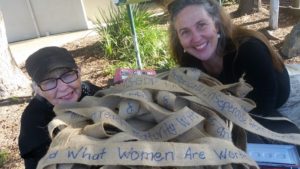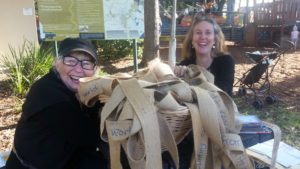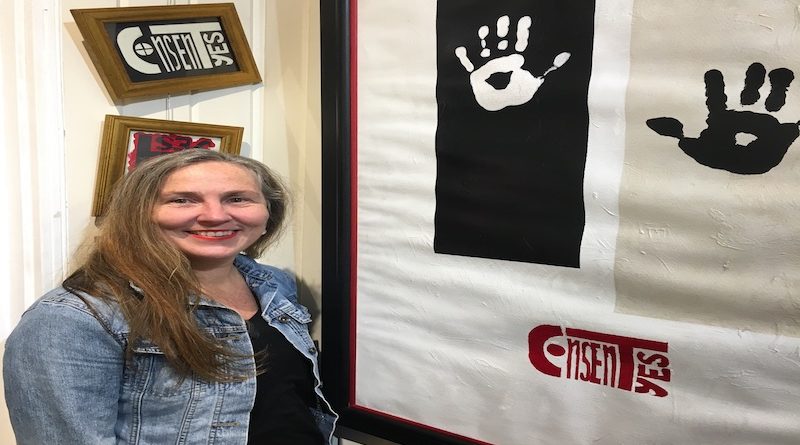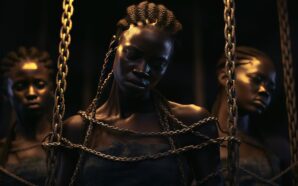Creativity and social connection have a natural association. Art has long been used to foster social justice by means of activism and to raise awareness of oppression, inequalities and injustice. Educating vulnerable people on issues that affect their lives such as rape, gender inequality, violence, poverty and discrimination underpins the significance of using art as a powerful tool for activism. The famous Bell Hooks quote “The function of art is to do more than tell it like it is, it’s to imagine what is possible” is a reference to feminist and intersectional art. Ananke interviewed one such artist who is driving change in her community through “artivism”.
 The Tall Trees Exhibition held on June 29-July 1, is possible through community based, not for profit organising whose undertaking is to develop and nurture artistic pursuits and interests throughout the Noosa Hinterland community in Queensland, Australia. Local artist and member of Tall Trees Inc., Karen Finzel exhibited her artwork titled Fine Line II at the exhibition to highlight the importance of consent. Fine Line II is a follow on from her artwork exhibited during the previous year’s exhibition, titled Fine Line, a reflection of the Stanford Rape Case. On viewing the recently aired story on Australia’s National Broadcasting Network, of the Saxon Mullins rape case, Karen began researching the prevalent issue of Violence against Women in Australia and this led to her reading about a program designed to stop campus sexual assault, underpinning the program is the message that “It’s not a yes unless it’s a hell yes” sending a clear message that consent matters. This was where she reached the point to create Fine Line II.
The Tall Trees Exhibition held on June 29-July 1, is possible through community based, not for profit organising whose undertaking is to develop and nurture artistic pursuits and interests throughout the Noosa Hinterland community in Queensland, Australia. Local artist and member of Tall Trees Inc., Karen Finzel exhibited her artwork titled Fine Line II at the exhibition to highlight the importance of consent. Fine Line II is a follow on from her artwork exhibited during the previous year’s exhibition, titled Fine Line, a reflection of the Stanford Rape Case. On viewing the recently aired story on Australia’s National Broadcasting Network, of the Saxon Mullins rape case, Karen began researching the prevalent issue of Violence against Women in Australia and this led to her reading about a program designed to stop campus sexual assault, underpinning the program is the message that “It’s not a yes unless it’s a hell yes” sending a clear message that consent matters. This was where she reached the point to create Fine Line II.
Consent is important in the intimate relationships between people of legal age because it means that there has been no fear, coercion, force or intimidation when making that choice. Our Watch and The Australian Rights Commissionrecognises it to be a serious and widespread problem in Australia, with enormous individual and community impacts and social costs. Australian Bureau of Statistics Data suggests that one in five women have experienced sexual violence (18% or 1.7 million). Violence against women is a fundamental violation of human rights, and one that Australia has an obligation to prevent under international law.
 Karen also co-exhibited another piece with fellow local artist, Kathleen Hunt, titled, The Laundry Basket. Kathleen articulated to Ananke that, The Laundry Basket is “a performance piece of contemporary commentary, growing out of weekly dialogues about the state of the nation, a visual arts practice/expression, affording us the opportunity of an immediate response to issues that are currently burning a hole”. The inspiration for The Laundry Basket was drawn from the article, making women’s unpaid work count with the underlying argument that the revolution is far from finished and right there under our noses in everyday life, in the appearance of women’s unpaid work.
Karen also co-exhibited another piece with fellow local artist, Kathleen Hunt, titled, The Laundry Basket. Kathleen articulated to Ananke that, The Laundry Basket is “a performance piece of contemporary commentary, growing out of weekly dialogues about the state of the nation, a visual arts practice/expression, affording us the opportunity of an immediate response to issues that are currently burning a hole”. The inspiration for The Laundry Basket was drawn from the article, making women’s unpaid work count with the underlying argument that the revolution is far from finished and right there under our noses in everyday life, in the appearance of women’s unpaid work.
Karen aspires to build a platform through her creative process to influence social change through research and conversation, with a grand vision towards the common goal of building a strong culture that supports zero tolerance to violence in all its forms. She hopes others might be inspired to adopt similar approaches in their communities through artivism, with the knowledge that you can be creative and open doors of dialogue using the most basic materials.
You can visit the Tall Trees website at: https://www.talltreesart.com/
Image credits: Kurt Olsen and The Laundry Basket images by Mia Hacker.











